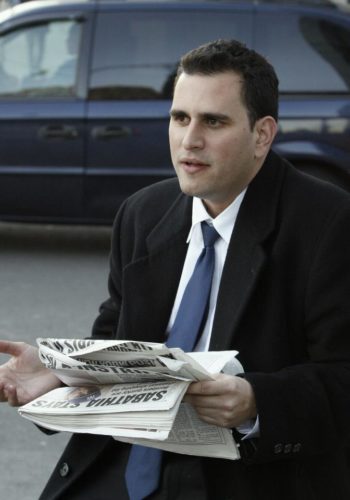
Kevin Deutsch (Credit: KevinDeutsch.us)
Finally. It took nearly five months, but Newsday finished its review of Kevin Deutsch and his 600 crime stories for the newspaper. The results — 77 problematic stories out of 600 stories, with 109 sources that could not be found — were revealed in a 960-word editor’s note this afternoon.
“The main points of the stories were not affected. While two stories about the Orlando nightclub shooter Omar Mateen were based on sources Newsday could not locate, other media reported the main points of those stories but with attribution from different sources,” Newsday said.
The Long Island newspaper had reviewed its former staff crime reporter’s work for nearly five months, since mid-February. Deutsch worked for Newsday from 2012 until last summer. Even after the results of this damaging review have been reported by his former employer, Deutsch still stands by his work and insists that his sources are real.
iMediaEthics’ earlier review of about 40 of Deutsch’s crime stories from Newsday, the New York Daily News, Newsweek and the New York Times revealed a total of 14 missing sources from 10 stories. iMediaEthics began our investigation into Deutsch’s work after seeing the New York Times‘ February editor’s note revealing it couldn’t verify two of Deutsch’s sources in a freelance article for the newspaper. Following that revelation, Newsday, the New York Daily News and Newsweek undertook reviews of his work.
Newsday has added editor’s notes to every story iMediaEthics flagged as problematic, confirming that Newsday, like iMediaEthics, couldn’t verify as real the following sources: Maryanne Barth, Patricia Dula, Aahil Khan, Jason Hart, Saaed Afzal, Eric Baumer, Omar Mateen, Frank Severance, Delia Bell-Powell, LaTroy Washington, and Richard Leiter. We’ve also contacted Newsweek and the New York Daily News for an update on the status of their reviews of Deutsch.
One outstanding question remains: iMediaEthics’ reporting revealed that Deutsch uses his own “fake” name for his byline at Newsday and elsewhere; his real name is Kevin Shulman. Why did news outlets where Deutsch was a staffer or freelancer apparently condone allowing him to use an assumed name without disclosure? We’ve asked Newsday this question and will also ask the others, a long list that includes Columbia Journalism Review, New York Post, Village Voice, the New York Times, the Miami Herald, the Palm Beach Post, the Riverdale Press and The Forward, in addition to Newsweek and the New York Daily News.
Deutsch’s website was down earlier today. iMediaEthics has written to Deutsch to ask for a response to the review of his work by Newsday and to ask if he took down his website. Deutsch posted a blogpost on his website after the review was released in which he still stood by his reporting and repeated defenses he has used in the past.
Even though Deutsch has been compared to the rogue’s gallery of fabulists — Stephen Glass, Jayson Blair, etc. — he had, perhaps, a record-breaking number of stories under review — more than 1,000 stories — and at four major news outlets, unlike Glass, Blair, et al, whose rogue reporting was confined to one newspaper or magazine. Despite the enormity of Deutsch’s deceptions, this has largely remained an “inside baseball” story. BuzzFeed, Rolling Stone, Mediaite and the Poynter Institute have reported on it and on iMediaEthics’ reporting, and the journalism industry appears to be fairly well aware of the ethical issues involved.
How Newsday Reviewed Kevin Deutsch’s Work
Newsday said in today’s main editor’s note it will add editor’s notes to stories affected. Newsday also explained how it undertook the review — using “local and national public records, sites providing nationwide people searches, databases of business, real estate and conviction records, social media sites including Facebook, LinkedIn and Ancestry.com and nationwide news archives.” Further, Newsday acknowledged that it can be hard to track down people after the fact and “it is possible” some were undocumented immigrants, addicts or criminals or related to them, and may not have wanted to respond to the review.
According to the editor’s note, Newsday asked Deutsch for notes and contact information and Newsday’s reviewers “followed up on all information shared by Deutsch.” Newsday added that Deutsch claimed contact information was in his work cell phone and a Rolodex; Newsday wipes out cell phones when they are returned “per company policy” and Newsday didn’t find a Rolodex. Further, Newsday said Deutsch didn’t give Newsday any contact information for the 109 missing sources in question.
“Newsday reporters and editors sought unsuccessfully several times to meet with Deutsch to discuss his reporting and to review his notes together to ensure we were not missing contact information or other details that might help locate individuals,” Newsday wrote.
Questions about Deutsch and his reporting have swirled since early February, when the Baltimore Sun reported doubts about the veracity of his latest book, Pill City, which purported to tell the story of Baltimore teens building an Uber-like drug network to sell pills stolen from Baltimore pharmacies in the riots after Freddie Gray’s death. Soon after the Sun tipped them off, the New York Times reviewed Deutsch’s sole freelance piece for the paper and revealed it couldn’t verify two of his sources as real.
While at first, Deutsch vigorously defended himself to iMediaEthics with bluster but no evidence for his sources, in March, he suddenly went silent, stopped responding to e-mails and stopped tweeting. He published a new article amidst the investigations on addiction website The Fix, but when iMediaEthics asked editors at the Fix if they could confirm his anonymous source was real, the Fix quickly unpublished the article. Deutsch then published that same article on the Huffington Post, which didn’t know about the reviews into and questions surrounding his work, or that he had previously published the same piece elsewhere.
Last we heard from Deutsch? iMediaEthics received a mystery call May 7, with the caller ID carrying Deutsch’s real name, Kevin Shulman. There was no heavy breathing, but he kept quiet for a minute or more while iMediaEthics’ editor-in-chief said “hello, hello,” and later “Kevin, is that you, are you there?” We immediately tweeted him, called the number and left a voicemail message, and e-mailed him, but have had no response or explanation.
This post is being updated as this is a breaking story.






